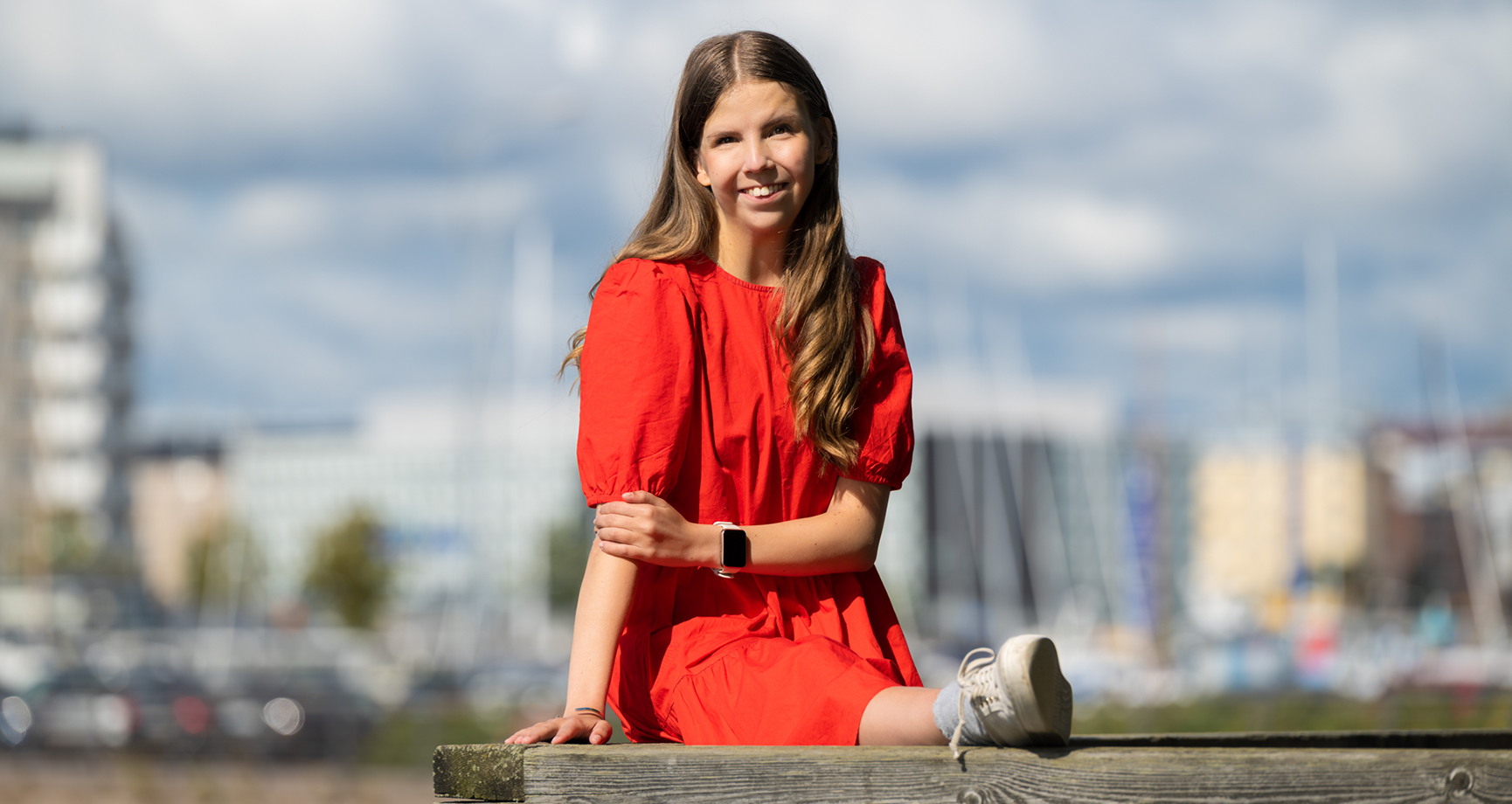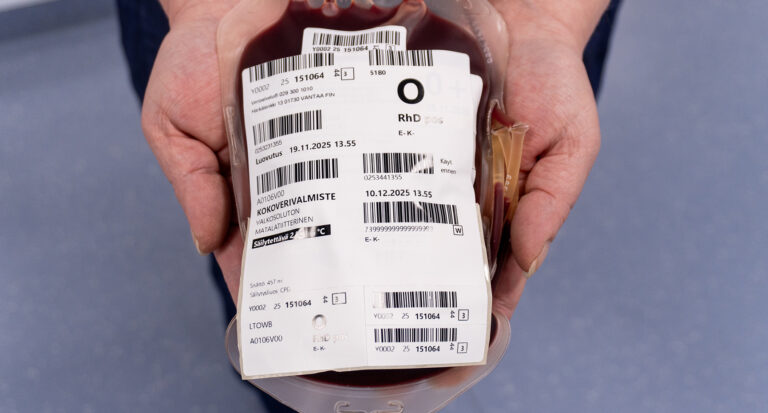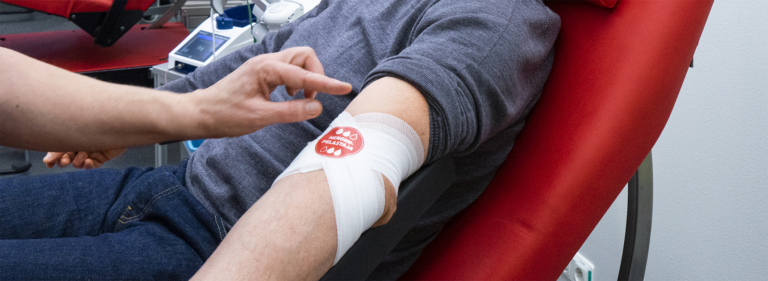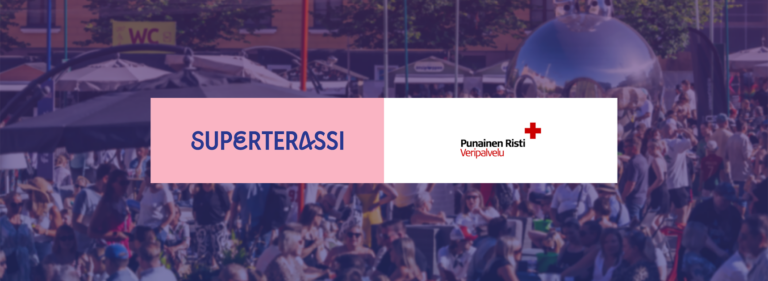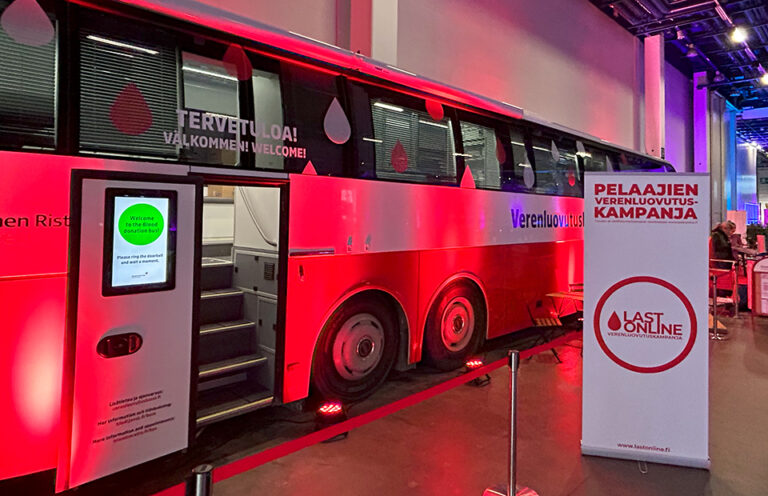Donors Make Elli’s Life Possible
Thanks to blood donors, Elli Malinen is able to live a good life – and help others too.

The autumn wind makes the hem of Elli Malinen’s skirt flutter as her leg stretches toward the sky like a ballerina’s. It’s clear that Elli has danced ballet for many years.
“I often hear that I don’t look sick,” she says.
Elli has a rare hereditary disease. Hemolytic anemia is caused by a genetic defect and is not visible from the outside.
“I was born with this disease, but until I was 19 I lived a fairly normal life and practiced ballet. Then things became more difficult, and I received red blood cells for the first time.”
Now, Elli goes to the lab once a week to check whether she needs more erythrocytes. She is admitted to the ward about once a month and receives erythrocyte transfusions approximately every other week.
Elli shows her calendar. It is filled with red markings—days spent in the hospital.
“I’m often on the ward for 3–5 days at a time. When things are going well, I can be at home for an entire week.”
Elli is too unwell to work or study.
“In the past, I thought I would study and move forward in life, but it would quickly lead to exhaustion. To cope, I need to do things that give me energy. Helping others brings me joy. I coordinate activities for young people with rare diseases, I lead story dance classes for children, and I teach ballet.”
“Every autumn it feels heavy when others my age return to their studies. I often wonder if I could do more. But I must not burn myself out by taking on too much.”
A Different Kind of Success
Elli says she has struggled with the fact that she cannot pursue a traditional career. It is easy to compare yourself with others your age, even when it makes no sense.
“I’ve come to understand that what matters is how you treat yourself and others.”
Elli has an Instagram account called Sairastellen, which could be translated as Living with Illness. It is her way of offering support and spreading awareness about life with a serious disease.
“Luckily, I’ve been able to turn my situation into something beautiful and good. I don’t do it for attention but so that no one has to feel as alone as I did.”
Once a month, Elli organizes peer support evenings for young people with rare diseases. She receives many messages of thanks from parents of sick children and from young patients.
“It is touching that I can be a role model or even an idol for a younger patient.”
Thank You to All Blood Donors!
Elli’s great passion since childhood has been to become a ballet teacher. She started dancing at the age of three and began ballet at seven.
“There’s not much left of that dream,” she says.
But the dream is not entirely gone. This autumn, Elli is teaching two youth ballet groups and a story dance group for children.
“I hope that in this way I can fulfill at least part of my dream of becoming a ballet teacher. I just have to see how much strength I have. I must always consider how hospital stays will fit into my calendar.”
“I am enormously grateful to all blood donors, because without red blood cell transfusions I would not be able to live as normal a life as this: meeting friends, traveling, and doing volunteer work. It’s nice to think that I can pass on the good.”
Elli often accompanies friends or her boyfriend when they donate blood.
“I’ve seen how friendly the Blood Service staff are and how pleasant they’ve made blood donation. I wish everyone would try donating at least once.”
Dare to Talk About What Isn’t Working
For Elli, it is important that shortcomings are addressed. As a patient-expert, she is part of the hospital’s customer panel, working to raise issues from the patient’s perspective.
“When people talk about patients, the focus is often on strength and joy. I am an optimistic and positive person, but it’s also okay to have other feelings. If you are dismissed or not acknowledged, it leads to anxiety. That can make even an energetic patient fearful.”
A good encounter builds trust and affects how a patient copes.
“If someone sees you only as a patient needing a procedure, they equate you with your illness. I meet hospital staff more often than my friends. So it’s good if they see me as a human being first, and perhaps ask about my weekend plans.”
Elli says her illness has taught her two important things:
First: when it feels like everything is falling apart, it is perfectly okay to feel that way. Things will feel better again.
And second: in today’s world, there are endless expectations about happiness and what a good life should contain, but in reality, small things are enough.
“At first, I thought I would soon get better and everything would be fine. I was 21 when we had tried all treatment options. What remained was red blood cell transfusion,” she says.
“I’ve had to accept that I am always tired and unwell. I no longer think it’s a bad day just because I’m exhausted. When you accept your situation, you have the chance to make the day a good one, even if you’re tired and have a headache.”
Elli has one request:
“Sometimes people give me nasty looks when I don’t stand up to give my seat to someone older on the bus. But you can’t always see how someone is doing just by looking at them. That’s why I hope people could approach others with more kindness.”
TEXT: NINA PINJOLA / MEDIAFOCUS
PHOTOS: MATTI RAJALA
